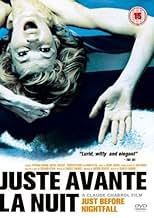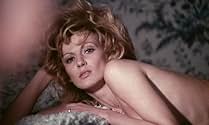IMDb-BEWERTUNG
7,2/10
2425
IHRE BEWERTUNG
Charles Masson, ein Werbefachmann, hat eine Affäre mit Laura, der Frau seines besten Freundes, des Architekten François Tellier. Charles erwürgt Laura, als eines ihrer SM-Spiele zu weit geht... Alles lesenCharles Masson, ein Werbefachmann, hat eine Affäre mit Laura, der Frau seines besten Freundes, des Architekten François Tellier. Charles erwürgt Laura, als eines ihrer SM-Spiele zu weit geht.Charles Masson, ein Werbefachmann, hat eine Affäre mit Laura, der Frau seines besten Freundes, des Architekten François Tellier. Charles erwürgt Laura, als eines ihrer SM-Spiele zu weit geht.
- Regie
- Drehbuch
- Hauptbesetzung
- 1 BAFTA Award gewonnen
- 1 Gewinn & 1 Nominierung insgesamt
Clelia Matania
- Mme Masson
- (as Clélia Matania)
Empfohlene Bewertungen
Just Before Nightfall is another Claude Chabrol film that focuses on infidelity and again it's an intriguing drama and an excellent exploration of the human condition. The film starts with a murder - but this is clearly not the point of the film as the murder happens right at the start and it's off-screen; the main focus of this film is the guilt felt by the lead character and the whole film focuses on that and it's effect on the character as well as all the people in his life. The film is based on a novel by Edouard Atiyah, and the basic plot is rather simple and really serves only as a base for the central focus of the film. The plot focuses on Charles Masson. Charles is having an affair with Laura, the wife of his friend François. The two practises S&M with one another and Charles' life is thrown into turmoil when he accidentally strangles Laura to death. He later learns that Laura's marriage with François was not the average marriage as both had other partners, but he is still consumed by guilt and it impacts his life with his beautiful wife Hélène and their three children.
As is always the case with Chabrol's thrillers, this one is not heavy on action, suspense and tension; but that is more than made up for by the central character study. All the main characters are developed well and believable. The main character, Charles, is certainly the most interesting of the piece; the way that guilt overtakes him provides a different take on the common murderer theme and makes for a very interesting watch. As ever with Chabrol films, the production values are excellent and the performances are superb. The central cast of Michel Bouquet, François Périer and the beautiful Stéphane Audran are all perfectly placed in their roles and provide the film with a strong backbone. The film doesn't move particularly quickly but Chabrol always keeps things interesting by keeping the focus on the lead characters and the central situation. Overall, Just Before Nightfall is an intriguing and thoughtful film handling the burden of guilt and I would not hesitate to name this film as one of Chabrol's very best alongside the likes of This Man Must Die, Le Boucher and Wedding in Blood.
As is always the case with Chabrol's thrillers, this one is not heavy on action, suspense and tension; but that is more than made up for by the central character study. All the main characters are developed well and believable. The main character, Charles, is certainly the most interesting of the piece; the way that guilt overtakes him provides a different take on the common murderer theme and makes for a very interesting watch. As ever with Chabrol films, the production values are excellent and the performances are superb. The central cast of Michel Bouquet, François Périer and the beautiful Stéphane Audran are all perfectly placed in their roles and provide the film with a strong backbone. The film doesn't move particularly quickly but Chabrol always keeps things interesting by keeping the focus on the lead characters and the central situation. Overall, Just Before Nightfall is an intriguing and thoughtful film handling the burden of guilt and I would not hesitate to name this film as one of Chabrol's very best alongside the likes of This Man Must Die, Le Boucher and Wedding in Blood.
This is the most morally exquisite of Chabrol's many explorations of the human condition. Guilt, forgiveness, revenge coexist and mutually triumph. Many of us assume these three moral stances are mutually incompatible. Chabrol balances them against each other and then fuses them together. The actors reveal their inner dilemmas with gestures more than words. Deep intentions run across surface motives. And the final gesture of this compelling film casts all that went before into another, deeper level. Of course, no deed is as simple as it seems. But few appreciate as Chabrol does here that our all too common morally mixed motives can continue to coexist to the grave. No evil deed is ever straightforward, but neither are the best ones.
Had Chabrol filmed this in the style of Bergman, this film would be a Criterion Classic. But filmed as a thriller, it has sadly failed to gain the audience and admiration it so richly deserves. It is a philosophical triumph!
Had Chabrol filmed this in the style of Bergman, this film would be a Criterion Classic. But filmed as a thriller, it has sadly failed to gain the audience and admiration it so richly deserves. It is a philosophical triumph!
I love a line in this movie from the executive Masson, he said he had his house designed by a modern architect to avoid the sclerosis of becoming bourgeois. Thats exactly what I think when I see modernist furniture and architecture. It's made for future people, dysfunction-free, productive, and clairvoyant. Only that's not quite how it works out. Here we have post-bourgeois people, who find themselves, like all the best swimmers, more likely to drown. They try to reinvent morality and instead trespass into treacherous areas which the ignorant forbid themselves through superstition, in the process jettisoning the wisdom of ages.
Yes this is a Chabrol film but don't believe it's a thriller, what we have here is more along the lines of Bergman. The police in this film are portrayed as merely being obnoxious, a nuisance to everyone involved in the murder. We are constantly waiting for the detective Cavanna to disappear from the screen.
We have a view here of people whom I'm sure Matthew Barney would call almost crystalline, devoid of potentiality. The film is so awful in this respect that it almost made me glad that we only tend to live eighty years. The tired-eyed men in this movie are weighed down with disillusion and regret, waiting for the end, their successes mere dust. Just before the night, indeed. Gone are their protean days, gone are the Alpheuses of youth. It's not so much a murder thriller as an essay into death. Masson, Tellier et al would welcome the cool breeze whispering through the cypresses on the island of the dead. One startling shot from a train shows Paris in twilight, looking grubby and ready for death itself.
I think more than anything this film is about mortality. Nowhere do we see hot blood in this film, only palsy and the damp skin of the pneumonic, the husband of the mudered woman even comforts the murderer. One part of the movie that I find astonishing is when Masson sees his employee of many many years, who has just been caught embezzling by the police and is now in custody. Masson looks at him with compassion, but the old man, who is now in a sense freer than he ever has been, looks him straight in the eye and tells him to screw himself. Masks off and a bonfire of the vanities.
This film is concentrated sulphuric acid, for more of the same see Les Bonnes Femmes and Les Cousins.
Yes this is a Chabrol film but don't believe it's a thriller, what we have here is more along the lines of Bergman. The police in this film are portrayed as merely being obnoxious, a nuisance to everyone involved in the murder. We are constantly waiting for the detective Cavanna to disappear from the screen.
We have a view here of people whom I'm sure Matthew Barney would call almost crystalline, devoid of potentiality. The film is so awful in this respect that it almost made me glad that we only tend to live eighty years. The tired-eyed men in this movie are weighed down with disillusion and regret, waiting for the end, their successes mere dust. Just before the night, indeed. Gone are their protean days, gone are the Alpheuses of youth. It's not so much a murder thriller as an essay into death. Masson, Tellier et al would welcome the cool breeze whispering through the cypresses on the island of the dead. One startling shot from a train shows Paris in twilight, looking grubby and ready for death itself.
I think more than anything this film is about mortality. Nowhere do we see hot blood in this film, only palsy and the damp skin of the pneumonic, the husband of the mudered woman even comforts the murderer. One part of the movie that I find astonishing is when Masson sees his employee of many many years, who has just been caught embezzling by the police and is now in custody. Masson looks at him with compassion, but the old man, who is now in a sense freer than he ever has been, looks him straight in the eye and tells him to screw himself. Masks off and a bonfire of the vanities.
This film is concentrated sulphuric acid, for more of the same see Les Bonnes Femmes and Les Cousins.
Fascinating view of middle class degeneracy in two married couples, with the less hypocritical paying to keep the whole facade going. Masochism, murder, desire for absolution, self-sacrifice. The acting and characterisation keep surprising. Like all Chabrol films it links to others in his filmography and will benefit from more viewings.
Possibly the best film Chabrol made, along with 'La femme Infidele' and 'Le boucher'. An intense psychological study and not really a thriller this was the first Chabrol film I ever watched. At first I was left confused and disappointed, however this powerful and moving film slowly revealed it's hidden beauty with each viewing.
This film more than any other of Chabrol's has entered my consciousness, Michael Bouquet's acting is very memorable and Stephanie Audran is astonishingly beautiful. There is no hint of mawkishness or sentimentality and one is left moved and glad of so poignant a masterpiece.
This film more than any other of Chabrol's has entered my consciousness, Michael Bouquet's acting is very memorable and Stephanie Audran is astonishingly beautiful. There is no hint of mawkishness or sentimentality and one is left moved and glad of so poignant a masterpiece.
Wusstest du schon
- WissenswertesThis is the last film of Claude Chabrol's 'Hélène cycle', in which actress Stéphane Audran starred, playing characters called Hélène in Die untreue Frau (1969), Der Schlachter (1970), and Der Riss (1970). The only film in the cycle which Audran didn't star in was Claude Chabrol´s Das Biest muss sterben (1969), the role of a character called Hélène was instead played by Caroline Cellier.
- VerbindungenVersion of Onna no naka ni iru tanin (1966)
- SoundtracksSilent Night
Original lyrics by Joseph Mohr and music by Franz Xaver Gruber, French lyrics by unknown lyricst
Played and sung in the Christmas morning scene
Top-Auswahl
Melde dich zum Bewerten an und greife auf die Watchlist für personalisierte Empfehlungen zu.
- How long is Just Before Nightfall?Powered by Alexa
Details
Zu dieser Seite beitragen
Bearbeitung vorschlagen oder fehlenden Inhalt hinzufügen































